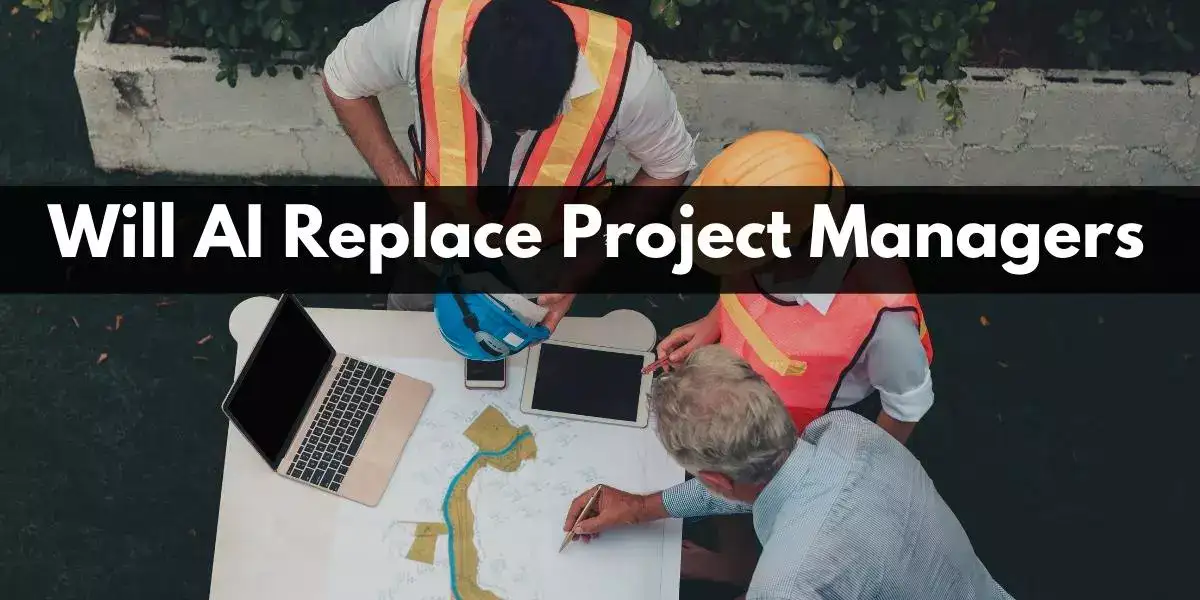AI is already being used in project management to automate repetitive tasks, analyze project data, and make predictions, among other things. But will it eventually replace project managers altogether? The answer is not straightforward,
So in this thorough explanation, We’ll explores the role of AI in project management, the impacts of AI in this job sector, the required skills for a project manager to hold their job, the potential benefits and drawbacks, and whether or not AI will ultimately replace project managers.

Will AI Replace Project Managers?
No. But, according to Gartner’s study, AI is predicted to undertake 80% of project management responsibilities by 2030. This indicates that although AI will certainly impact project management, project managers will probably still be needed in some capacities. Project managers will still be needed to oversee and manage projects, but they’ll work alongside AI tools to achieve better results.
What are the Impacts of The Project Management Job Sector?

Increased Demand for Project Managers
The project management job sector has experienced an increase in demand for project managers.
This demand has been fueled by the need for businesses to meet deadlines, manage resources effectively, and improve their overall project management processes.
Project managers are responsible for ensuring that projects are completed on time, within budget, and to the required quality standards.
With the increasing complexity of projects, businesses require skilled project managers who can manage these complexities effectively.
Higher Wages
Due to the increased demand for project managers, the salaries and wages for project management professionals have been rising.
Project managers who have the required skills, experience, and certifications are in high demand and can command higher wages.
PMI-certified project managers make 20% more than non-certified ones. This increase in wages has made project management an attractive career path for many individuals.
Career Growth Opportunities
The project management job sector offers numerous career growth opportunities. As a project manager gains experience and develops their skills, they can progress to higher levels within the organization.
Project managers can become program managers or portfolio managers, leading multiple projects or programs within an organization.
Additionally, they are capable of advancing to top roles like Chief Operating Officer (COO) or Chief top Officer. (CEO).
Improved Project Outcomes
Any project’s success depends on efficient project management. A capable project manager can make sure that tasks are carried out according to schedule, budget, and quality requirements.
They can manage risks, resolve issues, and ensure that all stakeholders are kept informed throughout the project.
Improved project outcomes can lead to increased customer satisfaction, improved brand reputation, and increased revenue for businesses.
Increased Competition
The growing demand for project managers has led to increased competition within the project management job sector.
To be successful in this sector, individuals must have the required skills, experience, and certifications.
They must also be able to adapt to the changing demands of the job market and be willing to develop their skills continuously.
Increased Customer Satisfaction
Project management focuses on delivering projects that meet customer expectations.
Project managers work closely with customers to identify their needs, define requirements, and ensure that project deliverables meet specifications.
By delivering projects that meet customer expectations, project managers can increase customer satisfaction, which can lead to repeat business and positive referrals.
Enhanced Quality Control
Project management methodologies emphasize quality control, which involves ensuring that project deliverables meet established quality standards.
Project managers use quality control techniques to monitor project progress, identify potential quality issues, and implement corrective actions to ensure that project deliverables meet established quality standards.
By doing so, organizations can enhance their reputation, increase customer satisfaction, and achieve their business objectives.
Improved Communication and Collaboration
Project management methodologies emphasize communication and collaboration, which are essential for successful project outcomes.
Project managers use various communication techniques to ensure that team members are informed about project progress, issues, and risks.
They also encourage collaboration between team members, which fosters creativity, innovation, and a sense of ownership among team members.
What Skills Are Required For A Project Manager To Hold Their Job?

Effective Communication
As a project manager, you will communicate with diverse stakeholders, including team members, clients, and senior management.
Effective communication skills are necessary to convey ideas, expectations, and project updates.
It’s crucial to be clear, concise, and articulate in your communication. You should also be a good listener to understand the concerns of your team members and clients.
Leadership and Motivation
Leadership is a critical skill for a project manager. You must lead by example, set expectations, and inspire your team to work towards the project’s goals.
As a leader, you should also be able to handle conflicts, provide guidance, and facilitate teamwork.
Motivating your team members and keeping them engaged is also important to ensure that the project’s progress is on track.
Time Management and Organization
Project managers are responsible for delivering projects on time and within budget. Time management and organization skills are crucial for achieving project deadlines.
You should be able to prioritize tasks, create schedules, and manage resources effectively.
It’s also important to monitor progress and make adjustments to the project plan as needed.
Risk Management
Every project has its set of risks. Project managers should identify and manage these risks proactively.
You should be able to assess the likelihood and impact of each risk, develop risk response plans, and monitor and control risks throughout the project’s life cycle.
Budgeting and Financial Management
Project managers are responsible for managing the project budget. You should have a good understanding of financial management principles, be able to develop accurate cost estimates, and manage expenses.
Monitoring project costs and making adjustments to stay within budget is also critical.
Technical Knowledge
To effectively manage AI-based projects, project managers must understand AI technologies, such as machine learning and natural language processing.
Having technical knowledge of the project’s subject matter is essential for project managers.
It helps understand the project’s requirements, develop solutions, and make informed decisions. You should also know the latest technological advancements in the project domain.
Problem-Solving and Decision Making
Project managers encounter various problems and challenges during the project life cycle. Being able to identify problems, analyze data, and develop solutions is crucial to keep the project on track.
You should also be able to make informed decisions based on available information and manage risks effectively.
Strategic thinking:
Project managers must be able to think strategically and anticipate potential roadblocks or challenges that may arise during the project.
They must have a deep understanding of the project’s objectives and how AI technology can help achieve them.
Adaptability:
The AI landscape is constantly changing, and project managers must be able to adapt quickly to new technologies and methodologies.
They must be open to new ideas and be willing to experiment with new tools and techniques to improve project outcomes.
Data analysis:
AI projects often involve large amounts of data, and project managers must understand data analysis and interpretation.
They must be able to make informed decisions based on data insights and provide guidance to their team members on how to leverage data to achieve project goals.
What Are The Benefits Of AI In Project Management?

Automating repetitive tasks
Automation is one of the most important advantages of AI in project management.
Artificial intelligence-powered solutions may automate time-consuming operations like data input, report creation, and scheduling, giving project managers more time to concentrate on more important duties.
Project managers may save countless hours of labor by using AI to produce Gantt charts, resource allocation reports, and project schedules, for instance.
Additionally lowering the possibility of human mistakes, this automation guarantees the accuracy and correctness of your project data.
Optimizing resource allocation
The potential of AI to optimize resource allocation in project management is a key advantage.
Artificial intelligence (AI) algorithms are able to analyze project data and provide suggestions on how to effectively allocate resources, including staff, time, and money.
Project managers may prevent over- or under-utilizing resources by employing AI to optimize resource allocation, ensuring that their projects are finished on time and within budget.
Improved Project Planning
AI can help project managers develop more accurate project plans. By analyzing historical data, AI algorithms can provide insights into the project’s timeline, budget, and resource requirements.
AI can also assist in creating project schedules, setting realistic deadlines, and identifying potential roadblocks.
For instance, using past data from the project, AI can estimate how long a job would take to complete, allowing project managers to more effectively deploy resources.
Enhanced Team Collaboration
Effective team collaboration is crucial for project success. AI can facilitate communication and collaboration among team members.
AI-powered project management tools can enable teams to share files, assign tasks, and provide real-time updates.
AI can also analyze communication patterns and identify potential conflicts or communication breakdowns.
For example, AI algorithms can detect if a team member is overloaded with work and suggest reassigning tasks to balance the workload.
Better Risk Management
Risk management is an essential aspect of project management. AI can help project managers identify potential risks and develop mitigation strategies.
AI algorithms can analyze project data to identify patterns that indicate potential risks.
For example, AI can detect if a project is running behind schedule or over budget and alert the project manager to take corrective action.
Additionally, AI can simulate different scenarios to determine the most effective risk management strategy.
Increased Efficiency and Productivity
AI can automate repetitive and time-consuming tasks, enabling project managers to focus on more strategic tasks.
AI-powered project management tools can automate data entry, document management, and task assignment.
AI can also analyze team performance data to identify areas for improvement and suggest process changes to increase efficiency.
For instance, AI can suggest project workflow changes to reduce delays and increase productivity.
Accurate Performance Analysis
AI can analyze project data to provide accurate performance analysis. AI algorithms can analyze team performance data to identify strengths and weaknesses.
For example, AI can detect if a team member is consistently missing deadlines or has a low completion rate.
AI can also analyze project performance data to identify areas for improvement.
For instance, AI can identify tasks that are taking longer than expected and suggest process improvements to increase efficiency.
What Are The Drawbacks Of AI In Project Management?

Lack of Human Interaction
One of the most significant drawbacks of AI in project management is the lack of human interaction. Although AI can be programmed to make decisions and analyze data, it can’t replace the human touch.
Human interaction is crucial for communication, collaboration, and building relationships.
For instance, if a project manager relies solely on AI for communication with team members, it can result in misinterpretations, misunderstandings, and even conflict.
Limited Scope
Another drawback of AI in project management is the limited scope. AI can analyze data and provide insights, but it can’t replace human intelligence, experience, and judgment.
AI algorithms can be trained to identify patterns, but they can’t comprehend the broader context of a project.
For instance, AI may see a bottleneck in a project but is unable to understand its causes, such as a lack of resources or skilled workers.
Dependence on Data Quality
AI in project management is highly dependent on data quality. If the data fed into the AI system is incomplete or inaccurate, the output will be unreliable.
Inaccurate data can lead to poor decision-making, incorrect predictions, and project failure.
For instance, if an AI system is fed data on past project performance, but the data is incomplete or inaccurate, the system may make incorrect predictions on future project performance.
Limited Creativity
The creative potential of AI in project management is constrained. AI cannot replace human creativity and invention, despite the fact that it may provide insights and suggestions.
In project management, creativity is crucial, particularly when working on challenging projects that call for original ideas.
An AI system, for instance, may recommend a solution based on historical data, while a human project manager might suggest an entirely original and ground-breaking approach.
High Initial Cost
It may be costly to use AI in project management, particularly for small and medium-sized enterprises.
It may take some time to see a return on investment after spending a considerable amount of money on purchasing and adopting AI technology.
Additional expenses may be incurred due to continuous upkeep and improvements.
FAQs
Can AI replace project managers entirely?
It is unlikely that AI can completely replace project managers in the near future.
While AI can automate some of project managers’ tasks, such as risk identification and estimation, project management also involves human skills such as communication, leadership, and problem-solving, which AI cannot replicate.
What Tasks Can AI Perform In Project Management?
AI can perform tasks such as scheduling, resource allocation, risk management, report generation, and data analysis.
AI can also provide real-time insights and recommendations based on big data and machine learning algorithms.
What Are The Benefits Of Using AI In Project Management?
The benefits of using AI in project management include enhanced efficiency and effectiveness, real-time insights and recommendations based on big data and machine learning algorithms, and automation of repetitive tasks
What Are The Limitations Of AI In Project Management?
The limitations of AI in project management include the inability to replicate human skills such as communication, leadership, and problem-solving, and the reliance on accurate and complete data inputs for machine learning algorithms.
Will AI Lead To Job Displacement Of Project Managers?
While AI may automate some of project managers’ tasks, it is unlikely to lead to job displacement of project managers entirely.
Project management involves human skills such as communication, leadership, and problem-solving, which AI cannot replicate.
Conclusion
The rise of artificial intelligence (AI) has led to concerns about whether it will replace project managers.
However, AI is unlikely to fully replace project managers as they bring a unique set of skills and experience to the table.
Instead, AI can assist project managers in their tasks and enhance their capabilities.
It’s important to embrace technological advancements and understand how they can complement our skills as project managers, rather than viewing them as a threat.





